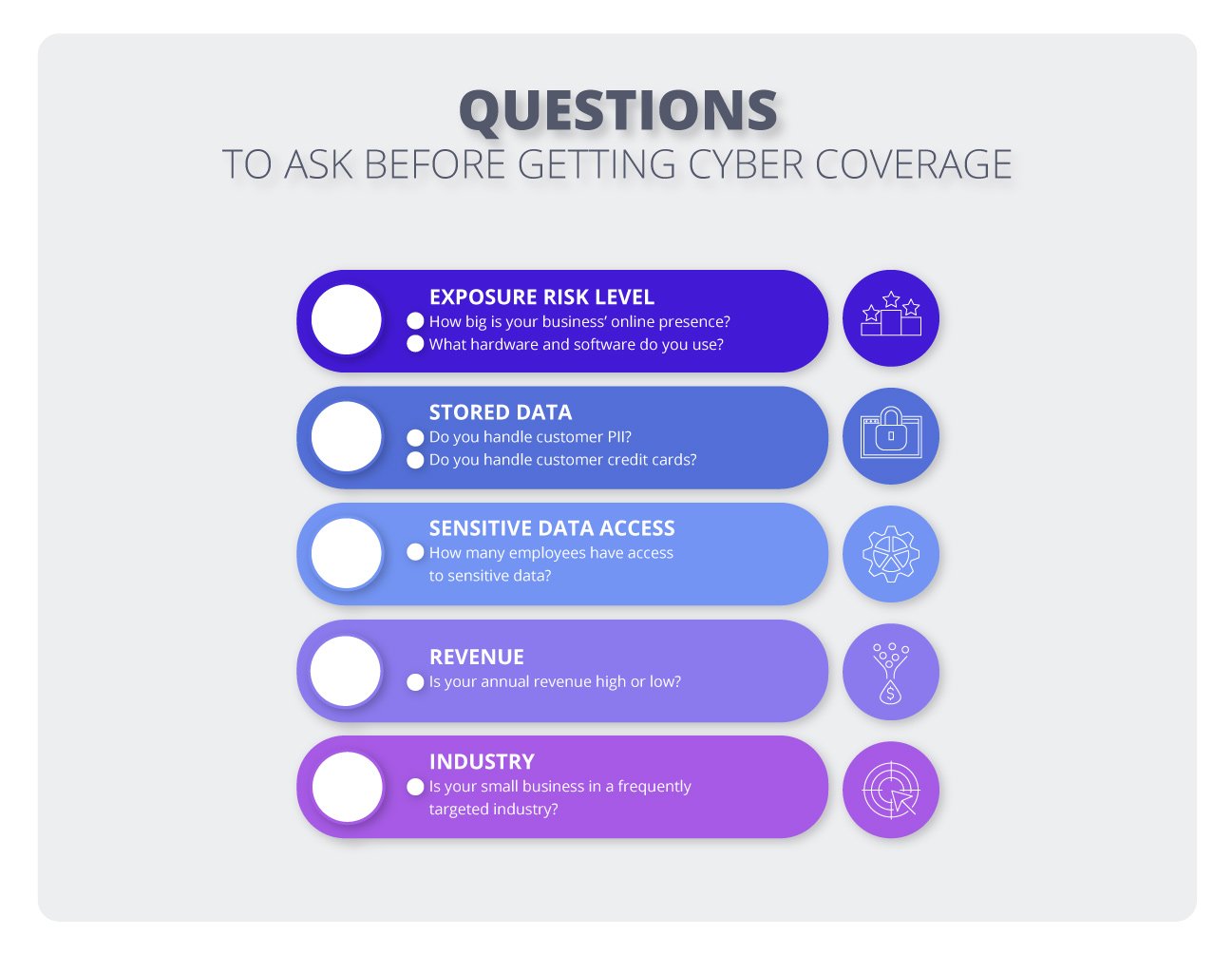
Cyber insurance
Cyber insurance
Cyber insurance, also called cybersecurity insurance, protects small businesses from the high costs of a data breach or malicious software attack. It covers expenses such as customer notification, credit monitoring, legal fees, and fines.
What is cyber insurance and why is it important for small businesses?
Cyberattacks and data breaches are expensive and increasingly common. Small businesses often have weak cybersecurity measures and large vulnerabilities, which makes them an attractive target for cybercriminals.
A cyberattack isn't just an inconvenience – it can put you out of business. The global average cost of a data breach in 2023 was $4.45 million, while nearly 43% of cyberattacks were against small businesses.
Cyber insurance coverage helps your business recover from financial losses caused by cyberattacks, data breaches, and other cyber events. It can pay for credit monitoring, attorney's fees, fines, data recovery, and other costly expenses.

Businesses that purchase cyber insurance typically handle:
- Credit card or bank account information
- Medical information
- Social Security numbers or driver's license numbers
- Customer names, email addresses, phone numbers, and addresses
- Cybersecurity for other businesses
What does cyber liability insurance cover?
Cybersecurity insurance covers your incident response costs associated with data breaches and cyberattacks, including the cost of recovering important data and hiring legal representation.
There are two types of cyber liability insurance coverage: first-party coverage and third-party coverage.
Most businesses need first-party cyber liability insurance to defend against their own cyber risks, especially if they handle personally identifiable information (PII) for customers.
Companies that are responsible for their clients' cybersecurity would need third-party cyber liability insurance to provide legal protection from client lawsuits.

What is first-party cyber liability insurance?
First-party cyber liability insurance, sometimes called data breach insurance, covers costs related to a data breach or cyberattack that directly impacts your business.
You can often add this coverage to your general liability insurance. It’s recommended for businesses that collect personal information, such as customer credit card numbers or email addresses.
Specifically, first-party cyber liability insurance can help cover:
Data breach response costs
State laws typically require a response when a business is impacted by a data breach. Cyber insurance helps cover costs associated with hiring a digital forensic expert to investigate the breach, customer notifications, consumer credit and fraud monitoring services, as well as Payment Card Industry (PCI) compliance fines.
Business interruption expenses
When a cyber incident brings necessary systems offline or otherwise grinds business to a halt, cyber insurance can help cover business interruption expenses, such as the cost of hiring additional staff or renting equipment. This includes purchasing third-party services, such as hiring a public relations manager or crisis management team.
Ransomware payments
If a hacker encrypts private information about your company or its employees and holds it for ransom, cyber liability insurance will help with payments to meet cyber extortion demands.
What is third-party cyber insurance coverage?
Third-party cyber liability coverage helps pay for legal costs when a client sues your company for failing to prevent a data breach or cyberattack at their company. This insurance is recommended for technology businesses that make software recommendations to clients or are responsible for their network security.
Third-party coverage can be bundled with your errors and omissions policy into what is known as technology errors and omissions insurance, or tech E&O.
Specifically, third-party cyber insurance can help cover:
Legal defense costs
If a client sues your business for failing to prevent a data breach at their business, cyber liability insurance could help cover attorney's fees and other legal costs for your defense in court.
Settlements
If your business faces a lawsuit from a client who experienced a data breach, you and the client could decide upon a settlement out of court that would amend the damages they experienced.
Court-ordered judgments
If a client accuses you of being responsible for a data breach at their business and sues your company, you may be legally obligated to pay for damages from any judgments in the lawsuit.
How much does cyber liability insurance cost?

Insureon customers pay an average premium of $145 per month for cyber insurance. The cost of cyber liability insurance is based on several factors including:
- Amount of sensitive data handled
- Your industry
- Coverage limits
- Number of employees
All of these factors will be instrumental in determining how much cyber insurance your small business needs.
What our customers are saying
How to protect your business from cyberattacks
WARNING! WARNING! WARNING! WARNING! WARNING!
Cyberattack! Cyberattack, oh yeah!! It's a cyberattack!
Don't worry, you have cyber liability insurance. Your small business is protected from cyberattacks and data breaches that can cost thousands of dollars.
Got it bad! Got it bad! Got it bad! Cyberattack!
What the heck, man? So, no encore? I'm gonna need a ride home. Can someone call my mom?
You can get all the coverage your business needs by following this link. Protection is peace of mind.
Data breaches are expensive and can take a long time to resolve. On average, it can take around 241 days for resolution if a breach is discovered internally, or closer to 320 days if the breach is disclosed by a hacker, according to a study by IBM and the Ponemon Institute. The study found that only one-third of breaches were discovered by an organization’s own staff.
A cyber liability insurance policy can help pay for:
- Mandatory notification of affected parties
- Investigating and fixing security flaws
- Several years of credit monitoring services for affected customers
- Loss of business opportunities
Complete our easy online insurance application to get free cyber liability insurance quotes that meet the needs of your small business.
Who needs cyber insurance?
Cyber liability insurance, sometimes called cybersecurity insurance, is a key policy for companies that operate in cybersecurity, work in a cloud environment, or handle sensitive customer information, such as credit card numbers.
While any business can fall victim to a data breach or cyberattack, a few industries are particularly vulnerable, including:
IT professionals
Cyber liability insurance for technology companies covers legal costs when a client blames you for failing to prevent a data breach or cyberattack at their business.
For example, if an IT consultant leaves data for a small healthcare company unsecured on Amazon Web Services, and a cyberattack exposes hundreds of Social Security numbers and email addresses belonging to the company's customers, the healthcare company could blame the consultant and file a lawsuit.
The consultant's cyber liability policy helps pay for legal defense costs and the eventual settlement.
Retailers
Cyber insurance helps retail businesses recover after a cyberattack exposes customer information. It's recommended for any shop that handles credit card numbers or other sensitive information.
For example, an employee at your clothing store accidentally opens a social engineering email containing a malicious computer virus. The virus encrypts data crucial to your business’s operations and demands a ransom for its retrieval.
Your cybersecurity insurance reimburses you for the ransom and for the cost of hiring someone to look into the source of the attack.

Depending on their industry and insurance provider, small businesses may be required to implement specific MFA requirements as part of their risk management plan to qualify for cyber insurance coverage.
Healthcare organizations
Healthcare organizations and medical service providers often have to abide by exceptionally strict privacy and security guidelines, such as HIPAA, to avoid regulatory fines and other legal consequences.
Cyber insurance for medical practices can help cover legal costs and provide essential resources, such as notifying clients or patients that their data was exposed, credit monitoring services for affected clients, and PR campaigns to restore reputation.
For example, a ransomware attack on a doctor's office could force them to lock their patient billing and scheduling software in order to investigate the breach and prevent further damage, affecting the office's 100,000 patients.
Cyber liability insurance would cover business interruption expenses while the facility works to reboot and upgrade security on its system.
Financial service providers
Cyber insurance can cover legal fees and expenses for financial professionals, while also providing vital resources to help recovery if they experience a cyberattack or data breach.
For example, if a tax preparer asks a client to upload a document with sensitive data online and that client data is stolen or compromised, the affected client might decide to sue the tax preparer to recoup expenses.
Cyber liability insurance can shield your business from legal expenses related to a data breach by paying for court costs and attorney fees.
Real estate professionals
Cyber liability insurance for real estate professionals can help pay for recovery expenses while also providing resources to help aid customers affected by a data breach.
For example, a real estate agent loses a laptop containing sensitive client information. The data breach laws in their state require them to notify their customers, and they also run a PR campaign to help restore trust.
Cyber insurance provides coverage for notification costs, PR efforts, fraud monitoring services, and other related expenses.

Top professions that need cyber insurance
Don't see your profession? Don't worry. We insure most businesses.
What does cyber liability insurance not cover?
While cyber insurance covers costs related to cyber threats, it does have a number of coverage exclusions. For example, it does not cover data loss caused by a power outage.
Other exclusions from cyber liability insurance coverage include:
Mistakes and oversights
Professional liability insurance, also called errors and omissions insurance, covers the costs of lawsuits over mistakes and oversights. This policy also covers legal costs related to professional negligence.
Data loss caused by accidental damage
While a cyber insurance policy covers data lost in a software attack, it does not insure data lost from accidental physical damage to a network or storage device.
Electronic data liability coverage expands the property damage coverage in a business owner's policy (BOP) to include a loss of data caused by accidental damage to a customer’s computer, hard drive, or other data storage equipment.
Data loss from natural occurrences
If you experience data loss during a power surge, fire, or natural disaster, you would need electronic data processing (EDP) insurance. You can typically bundle this coverage in a business owner's policy. It provides protection for data loss in your electronic data processing equipment, such as computers and backup systems.
General liability insurance
Business owner’s policy
Workers’ compensation insurance
Commercial auto insurance
Commercial umbrella insurance
FAQs about cyber insurance
Get answers to common questions about cyber insurance.
How do cyberattacks happen?
Cyberattacks can happen when network security at a business is not up to date, or employees lack the training or knowledge to recognize phishing attempts, ransomware, and other cyber hacking red flags.
According to a recent report, 82% of ransomware attacks target small businesses. Ransomware gangs often attempt to extort companies that are lucrative enough to pay a hefty ransom, but also small enough to make hacking attempts easier, as well as keep media and law enforcement attention low during the fallout.
When a data breach or cyberattack occurs at a business, cyber liability insurance can help defray costs to the business and help a company survive the breach.
Learn more about protecting your business from ransomware attacks and other threats.

What are some examples of data breaches and cyberattacks?
Cybercrime is a multibillion-dollar industry. Security firms constantly struggle to stay ahead of hackers looking for lucrative victims. Even with careful security measures in place, catastrophic data breaches can, and do, occur.
For example, MailChimp recently suffered a second data breach where a threat actor gained access to data attached to 133 accounts through a social engineering attack. This attack is just one of many that occurred in recent years.
Phishing emails, malware, security breaches, network security issues, and computer system breakdowns are just a few examples of the kinds of cyber risks that could cause serious liability or losses.
This could impact a financial planning business that stores bank account information, or even a gaming app developer that collects user profile information.
Learn more about what to do after a data breach.
Where can I learn more about cyber liability insurance?
If you want to learn more about this policy, you can find additional answers in our frequently asked questions about cyber insurance.
You can also contact an Insureon agent to discuss cyber liability and the types of business insurance you may need as part of your risk assessment and management plan. We can help you choose the right insurance products and discuss pricing, with quotes from top-rated insurance companies.



























